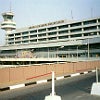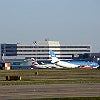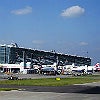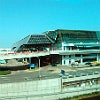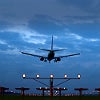
Nigeria plans to build 11 airport terminals with Chinese loan
China has been investing heavily in African projects during the last few years, often providing loans and expertise for infrastructure projects to help secure raw resources to fuel its own economic expansion.
Last month, the Nigerian Government announced that it would take a $666.8m loan from the Export-Import Bank of China to fund the development of five new international terminals and six new cargo terminals around the country.
The terminals, which will be built in Abuja, Lagos, Port Harcourt, Kano and other locations, will add to Nigeria’s ongoing remodelling of 11 airports as part of a project that is currently 80% complete, according to Nigeria’s Minister of Aviation Princess Stella Adaeze Oduah.
MIRA’s unmanned ground vehicles to secure airport perimeters
Could unmanned ground vehicles (UGVs) represent the future of perimeter security at airports?
It’s a question that is clearly on the mind of engineering company MIRA, which announced it would target the airport industry as a potential market for its MIRA Autonomous Control Equipment (MACE).
MIRA’s UGV is proven in the defence market, with customers such as the UK Ministry of Defence, Lockheed Martin and BAE Systems, but the company believes it could also play an important role as an autonomous sentry to protect external airport infrastructure.
How well do you really know your competitors?
Access the most comprehensive Company Profiles on the market, powered by GlobalData. Save hours of research. Gain competitive edge.

Thank you!
Your download email will arrive shortly
Not ready to buy yet? Download a free sample
We are confident about the unique quality of our Company Profiles. However, we want you to make the most beneficial decision for your business, so we offer a free sample that you can download by submitting the below form
By GlobalDataAirports hope apps and social media will enhance passenger experiences
Social media and mobile technologies are pervasive in a host of customer-driven industries, and according to the latest SITA Airport IT Trends Survey, airports are no different.
The survey revealed that 59% of the world’s airports are investing in IT to improve customer service.
Around 88% of airports are planning to develop their own mobile apps by the end of 2015 to update passengers on the status of flights and other information, while 78% said they were investing in the development of social media.
One in ten operators currently uses mobile apps to help travellers navigate airports, with this figure expected to grow to 70% by 2015.
Manchester Airport to scrap ‘naked’ body scanners in October
A European Commission ruling that withheld the approval of so-called ‘naked’ body scanners for permanent use at airports has led Manchester Airport in the UK to scrap the use of its own scanner systems in October 2012.
The airport will instead invest in 55 extra security staff, as well as new scanners from L3 that automatically notify staff about which parts of a passenger’s body to check.
The airport, which had been trialling the scanners for the last two years, expressed frustration at the termination of what it considered to be a successful trial over privacy and health concerns.
"The overwhelming majority of our passengers and security staff prefer body scanners to frisking and it’s frustrating that Brussels has allowed this successful trial to end," said Manchester Airports Group COO Andrew Harrison.
UK NATS to lead ‘perfect’ transatlantic flights trial project
The UK’s air traffic services provider NATS announced in September that it would lead a new project called Topflight to develop an optimised flight concept that would significantly reduce CO2 emissions and fuel consumption.
The project, which is part of Europe’s Single European Sky initiative, will test British Airways flights to US destinations using factors such as improved taxiing, enhanced flight profiles and continuous descent approaches, in an attempt to ‘perfect’ the optimal environmental performance.
NATS predicted that its methods could save around 500kg of fuel for each flight, or 1.6 tons of emitted CO2.
Taiwan invests $15.5bn to expand Taoyuan International Airport
Growing traffic levels at Taoyuan International Airport near Taipei, Taiwan, have prompted the Taiwanese Government to invest $15.5bn in a huge expansion of the airport’s capacity.
Of the total cost, $11.4bn will be funded by the government, with the rest of the money coming from the private sector. The airport’s area will be expanded by around a third, adding 442ha to make room for a new terminal and runway.
The project will add an aerospace industrial park and exclusive zones for cargo, passenger and logistics services, with completion for the whole project expected in 2030.
The new Terminal Three is scheduled for completion in 2018, and the Taiwanese Government said the airport’s capacity would eventually be doubled to around 75 million passengers each year.
FAA begins NextGen programme in Florida airspace
The US Federal Aviation Administration (FAA) also has plans to improve flight efficiency with its NextGen aviation initiative.
As part of NextGen, the agency has launched the Metroplex project in Florida airspace to improve approaches and descents at all airports in the region.
Metroplex involves the use of performance-based navigation to allow pilots to use radar, satellite or on-board flight management systems, with the aim of improving air traffic flow into and out of Florida’s airports, reducing delays and cutting flight emissions.

